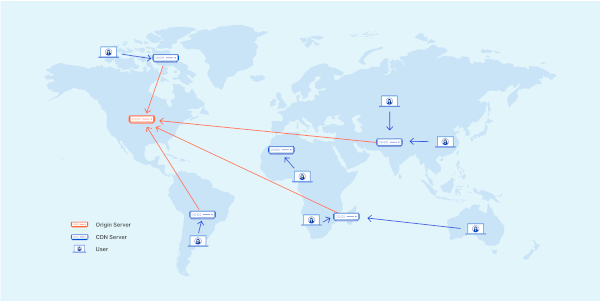
May 30th, 2023
In today's fast-paced world, website speed is crucial for maintaining a competitive online presence. Content Delivery Networks (CDNs) have gained popularity as a tool to enhance website performance by reducing latency and improving loading times. While CDNs undoubtedly offer numerous benefits, there are several misconceptions surrounding their usage. In this article, we aim to debunk some of the common myths associated with using a CDN to speed up your website.
Myth 1: CDNs are only useful for large websites
One common misconception is that CDNs are only beneficial for large-scale websites with high traffic volumes. The truth is, CDNs can be advantageous for websites of all sizes. CDNs work by distributing website content across multiple servers located in various geographical locations. This allows users to access the content from a server nearest to their location, reducing latency and improving overall website speed. Even small websites can benefit from this technology, as it helps deliver content more efficiently to users regardless of their geographic location.
Myth 2: CDNs are expensive and only affordable for big enterprises
While it's true that some CDNs can be costly, there are numerous affordable CDN options available in the market. Over the years, the CDN market has become highly competitive, leading to a wider range of pricing options. Many CDN providers offer tiered plans, allowing businesses of all sizes to select a package that suits their budget and requirements. Additionally, the cost of a CDN should be considered in relation to the potential benefits it brings in terms of improved website performance, user experience, and conversion rates.
Myth 3: CDNs are only beneficial for static content
Another prevalent myth is that CDNs are primarily designed for caching static content, such as images, CSS files, and JavaScript. While it is true that CDNs excel at caching static content, modern CDNs also support dynamic content acceleration. Through advanced caching techniques and intelligent routing algorithms, CDNs can effectively deliver dynamic content, including personalized pages, database-driven applications, and even API responses. CDNs work in conjunction with origin servers, seamlessly caching and delivering both static and dynamic content to end-users.
Myth 4: CDNs can fully replace the need for server optimization
Some believe that implementing a CDN eliminates the need for server optimization and other website performance enhancements. While CDNs undoubtedly offer significant performance improvements, they should be seen as complementary to other optimization techniques, rather than a substitute. Optimizing server configurations, employing efficient coding practices, and minimizing the size of resources are all essential steps that should be taken alongside CDN implementation. A combination of server optimization and CDN utilization can result in a highly optimized and fast website.
Myth 5: CDNs guarantee instant website speed improvement
Although CDNs can substantially enhance website speed, they do not provide an instant fix for all performance issues. Factors such as poorly optimized code, excessive third-party scripts, or server-side bottlenecks can still impact website speed, even with a CDN in place. CDNs are most effective in reducing latency and network congestion, but they cannot compensate for fundamental performance flaws within the website itself. It's important to conduct regular performance audits, optimize code, and monitor the overall website infrastructure for optimal results.
Conclusion
CDNs offer significant benefits for website performance, but it is important to separate fact from fiction when considering their implementation. Dispelling common myths about CDNs can help website owners make informed decisions about utilizing this technology. CDNs are valuable tools that can enhance website speed, improve user experience, and boost conversion rates, regardless of the size of the website. However, it is crucial to remember that CDNs should be combined with other optimization techniques and regular performance monitoring to achieve optimal results.
Do you have any questions about CDNs? If so, contact us today!
